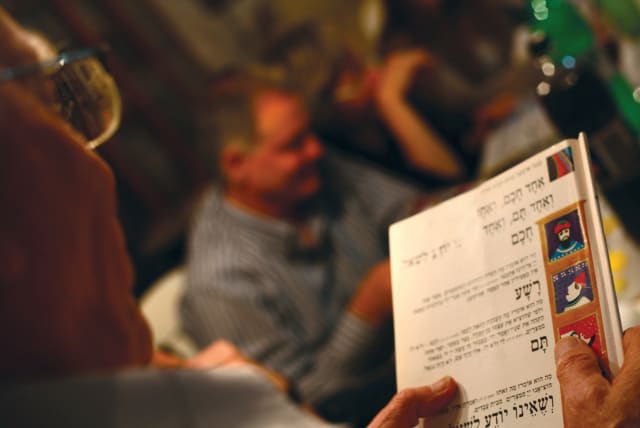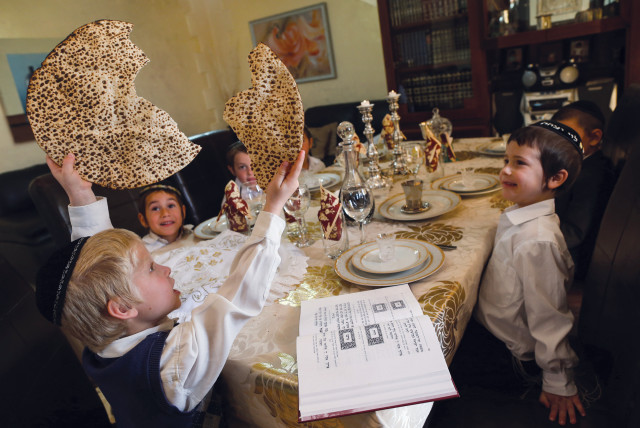A Passover Seder Haggadah supplement for the Israel-Hamas war

I am suggesting several thoughts and themes to complement the Haggadah text and add focus to our present situation. You are encouraged to keep this page in your Haggadah on Seder night.
The answer, of course, is that this year we are fighting a major war against several enemies on several different fronts. It is therefore appropriate – if not obligatory – for us to devote a good deal of prayer and attention to the special circumstances in which we find ourselves.
To that end, I am suggesting several thoughts and themes to complement the Haggadah text and add focus to our present situation. Like the Torah itself, the Haggadah is a “living document” that not only retells history but offers fresh and contemporary wisdom for our times as well. You are encouraged to keep this page in your Haggadah and refer to it on Seder night.
KADESH:
We begin most major Jewish holidays by reciting Kiddush. In effect, we are “toasting” God for the miracles we experience, particularly our liberation from slavery and our exodus from Egypt. We certainly can add this week’s miraculous events, whereby the massive barrage from Iran and its proxies completely failed to harm us. The enemy fired 331 projectiles at us, to no avail. Though we went to sleep dreading possible disaster, we awoke to complete salvation. No wonder that 331 is the gematriya (numerical value) of Baruch Hashem b’layla – blessed is God at night.
“Kadesh” also has a root meaning of kodesh – holy. We should remind ourselves and our children that the men and women of the IDF are the holy messengers of the Almighty; they are the means by which God fulfills the promise to protect us from harm.
We should also have special kavana/intent and awareness when we recite the Shehecheyanu blessing at the end of the Kiddush, as we thank God for allowing us to be alive to witness these cataclysmic events.
URCHATZ and RACHATZ:
Twice at the Seder, we wash our hands. This is done as a form of spiritual preparation, as water – such as immersion in a mikveh – is always a means of purification. But it also brings to mind one of the great hardships of battle – the inability of combat soldiers to wash or bathe for long periods of time while in a war zone. Many soldiers reported that this was a major challenge, and so there were portable showers brought into Gaza to afford the troops the opportunity to cleanse themselves.
KARPAS:
Passover is a spring festival, so we eat a vegetable (celery, parsley, potato, etc.) near the start of the Seder to signify the time of year the exodus took place. The current, ongoing war is the first major one we have waged in Israel during springtime (besides the 1948 War of Independence, which began on May 15, just two weeks after Passover). We dip the karpas in salt water, reminiscent of the tears we cry over what we have suffered and the necessity to engage in warfare, especially at such a beautiful time of the year as spring.
The Hebrew letters of “karpas,” when written in reverse, spell s(amech) perach, or 60 myriads (600,000) of people at hard labor. An enormous amount of work goes into fighting a war; not only by the thousands of combatants, but also by the untold number of people in the military and home fronts who form the support system that backs up our soldiers. This includes the families at home and the countless volunteers helping to feed the soldiers and supply them with equipment above and beyond what the army provides. It is hard work, indeed, and should be recognized and applauded.
YACHATZ:
We have three matzot on our Seder table, representing the tribal totality of Kohen, Levi, and Israelite. By tradition, we break the middle matzah in two. Perhaps this act signifies the unfortunate state of disunity that all too often afflicts us. When we are together as one – such as our wall-to-wall support for our fighting forces in the field – we will certainly be victorious. But when we are divided, that is the time when we are most vulnerable and subject to calamity.
The “missing” piece of matzah is called the afikoman. It will reappear at the end of the Seder, when by eating it, the broken matzah will symbolically be made whole again. It is a reminder that our historic redemption will only occur in full when the pieces of our nation are once again joined together and complete.
MAGID:
The central portion of the Haggadah, of course, is the narrative of the exodus, starting with our enslavement and concluding with the splitting of the Red Sea and our redemption. Originally composed in the Diaspora, the Haggadah points to Israel. The text begins with the statement “Today we are here; next year may we be in the Land of Israel” and concludes with the exuberant “Le’shana haba’a b’Yerushalayim! – Next year in Jerusalem!” Magid contains a number of other memorable sections:
The Four Children.
We know them well – the Wise, the Rebellious, the Uninformed, and the Uninterested – each of whom has a unique personality, and each is welcome at our Seder table.
There is, of course, the fifth child. In past years, this may have been the Soviet Jew unable to emigrate, or the Ethiopian Jew seeking Israeli citizenship. It also may have been the estranged children of the exile, so assimilated that they did not even know what a Seder was – unlike Israelis, more than 90% of whom attend a Seder. This year, that fifth child is the hostage still being held by Hamas, as well as the soldier who must remain vigilant in Gaza, perhaps carrying some matzah in a backpack but unable to leave his or her post. They must also be virtually represented as a special guest at our table.
Ve’hi Sheh’amda.
We raise our wine glasses and proclaim: “In every generation, they rise up to destroy us, but the Holy One saves us from their hands.” You can be a believer or a skeptic, but if you awoke Sunday morning and did not acknowledge the other-worldliness of our rescue from the Iranian attack, you are definitely not a realist! You would be odd, indeed, and at complete odds with the law of probabilities, to believe that not one Jew would be harmed by the hundreds of missiles fired at our borders.
The Ten Plagues.
At this point in the Seder, we draw and spill a drop of our (red) wine as we recount the ten plagues. While common understanding is that we do this to show regret for the misfortune of the Egyptians, an equally valid opinion is that we are recalling all the ways that we suffered. And we indeed have been “plagued” by suffering in this latest war: Much Israeli blood has been spilled; a hail of rockets has rained down upon us; the terrorists are wild beasts of the most savage order; even our animals – hundreds of them – were shot and killed by Hamas. More than one “firstborn,” the pride of his or her family, was brutally slain among the thousands murdered.
Dayenu.
“It would have been enough.” One of the most popular and upbeat songs of the Seder, “Dayenu” is more than a bit perplexing: “If God had divided the sea, yet had not taken us across to dry land, it would have been enough.” Seriously?! If we died there, never to enter Israel, why would that have been enough?! The only answer here is to see this through the eyes of the Israelites back then, who, at each step of the way, appreciated what God had already done for them, without focusing on the dangers to come. We, too, must be thankful for the many successes we have achieved so far in this war; we must stop at each juncture and show our gratitude before we fixate and obsess about the challenges down the road.
B’chol dor va’dor.
“In every generation, we must see ourselves as if we had actually come out of Egypt.” Each of us is a historical Jew. That is, we do not live in this generation alone, confined to our own limited life span; a part of us has traveled an ancient path. We prayed in both Temples in Jerusalem, and we agonized through their destructions. We wandered across the planet and endured pogroms, the Inquisition, and the Holocaust. We re-established Israel, and we fought all its wars. And now we are locked in existential combat against the Hamas and Iranian threats. It is a frightening moment, to be sure; but because we have been there before, because we survived all the other challenges to our existence, we have an inner certainty that we will triumph again.
Hallel and the songs.
The latter part of the Seder – well worth staying awake for! – is decidedly upbeat, filled with joyous song and celebration. We recite the Hallel, praising God who “delivers us from death and dries our tears,” whom we trust “even when we suffer deeply.” We even express a sincere belief that at some point, the nations that now oppress us will eventually acknowledge the justness of our cause and reverse their enmity toward us.
One song, “Vay’hi b’chatzi ha’layla” – “And it was in the middle of the night” – records all the times in our history when we were saved at midnight, when things appeared their darkest, and to which we may now add the newest stanza, recalling that “Baruch Hashem b’layla” – “Blessed is God at night” – equals the 331 projectiles we all survived.
We ask for the rebuilding of the Temple and invite Elijah the Prophet in to join us for a drink, telling him that we are ready – boy, are we ready! – for that last, triumphant age of world peace and prosperity.
Finally, in the song “Chad Gadya,” our Father in Heaven’s beloved little goat, which is eternally preyed upon by civilization’s great empires, walks onto the stage. Babylonia, Greece, Rome, Persia, Spain, the USSR, and the Nazis have all played their part and vanished into oblivion. Now it is Gaza’s and Iran’s turn to fade away.
May we merit God’s saving power and emerge from this crisis stronger and more determined than ever to safeguard our beloved country. “In Nisan we were redeemed, and in Nisan we shall be redeemed again.”
Chag kasher ve’sameach!
With thanks to Robert Silber.
The writer is director of the Jewish Outreach Center of Ra’anana. rabbistewart@gmail.com
Jerusalem Post Store
`; document.getElementById("linkPremium").innerHTML = cont; var divWithLink = document.getElementById("premium-link"); if (divWithLink !== null && divWithLink !== 'undefined') { divWithLink.style.border = "solid 1px #cb0f3e"; divWithLink.style.textAlign = "center"; divWithLink.style.marginBottom = "15px"; divWithLink.style.marginTop = "15px"; divWithLink.style.width = "100%"; divWithLink.style.backgroundColor = "#122952"; divWithLink.style.color = "#ffffff"; divWithLink.style.lineHeight = "1.5"; } } (function (v, i) { });

